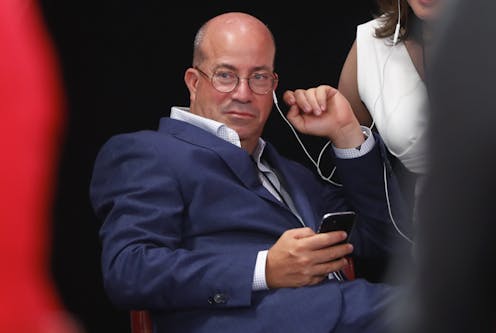CNN president Jeff Zucker’s resignation shows why even consensual office romances can cause problems
- Written by Vanessa Bohns, Associate Professor of Organizational Behavior, Cornell University

Former CNN president Jeff Zucker became the latest executive to lose his job[1] over a consensual relationship with a subordinate.
Zucker stepped down on Feb. 2, 2022, acknowledging in a statement that he was “required to disclose” the relationship but didn’t. “I was wrong,” he said.
The news follows previous incidents in which executives[2] or other leaders[3] were fired or resigned over consensual relationships with employees they oversaw. Most recently, the University of Michigan[4] ousted its president after learning of his affair with a subordinate.
It’s common for organizations to have policies[5] related to romantic relationships between employees, including requiring disclosure of relationships between coworkers or banning sexual relationships between supervisors and employees altogether.
Whether policies overseeing consensual relationships at work are really necessary has been debated[6] many times[7]. And it seems reasonable to ask: Shouldn’t mutually consenting adults be allowed to make these decisions for themselves?
Based on my research on power and influence[8], I believe the short answer is probably not.
Policies that regulate romance at work
A growing number of companies are clamping down on office romances[9], particularly those marked by power imbalances.
The #MeToo movement led many companies to reassess their policies surrounding workplace relationships, leading to an increase in “love contracts,” or relationship disclosures[10]. A June 2018 survey found that 78% of human resources executives said their employers didn’t allow relationships between managers and direct reports[11].
And academic institutions[12] – including my own, Cornell,[13] and the University of Michigan[14] – are also increasingly prohibiting relationships between professors and students, deeming them inherently problematic.
In the past, some organizations, such as the International Monetary Fund, have been much more permissive[15].
Opponents of these sorts of bans and similar policies consider them to be paternalistic overreach, arguing that institutions ought not police[16] the private lives and relationships of mutually consenting adults. In other words, they believe two intelligent people with good intentions should be trusted to manage the power dynamics in their own relationship.
An unbalanced relationship
A key problem is that people in positions of power have a hard time recognizing the coercive nature of that power in an unbalanced relationship.
In one of my studies[17], participants asked other people for various favors ranging from the innocuous, such as to donate money to charity, to the unethical – to lie for them. In each case, the people making the request underestimated how uncomfortable others would feel saying “no.”
Follow-up work[18] that my former graduate student Lauren DeVincent and I conducted found that similar dynamics play out in romantic relationships at work. Individuals who make romantic advances toward coworkers underestimate how uncomfortable the targets of their advances feel rejecting them.
[More than 140,000 readers get one of The Conversation’s informative newsletters. Join the list today[19].]
Notably, in a phenomenon dubbed the “power amplification effect[20]” by psychologist Adam Galinsky, these dynamics can be, as the name implies, amplified when there’s an uneven power dynamic. Even simple, polite requests can feel like directives when they come from your boss.
Yet people in positions of power tend to be oblivious to the influence they wield over others because they are less likely to take the other party’s perspective[21]. This makes it difficult for powerful people to recognize when another person feels compelled to go along with their requests.
All of this means that people in positions of power can’t be trusted to recognize abuses of power they may commit when engaging in a romantic relationship with a subordinate.
Subordinates have blind spots, too
That ultimately leaves it up to the subordinate to recognize and highlight such abuses if and when they occur.
However, despite how emboldened someone might imagine they would feel to do so, research finds that we tend to overestimate how comfortable we would actually feel. For example, in research by psychologists Julie Woodzicka and Marianne LaFrance, the majority of women who read a hypothetical scenario about being sexually harassed during a job interview said they would confront the interviewer[22]. Yet when these researchers staged an actual episode of sexual harassment during what participants thought was a real job interview, hardly any of the participants actually did so.
Bans on sexual relationships between supervisors and subordinates serve multiple purposes, such as protecting the involved parties from the risk of retaliation if a relationship ends and preventing concerns about favoritism.
And policies such as CNN’s[23] allow objective parties to determine whether there are potential conflicts of interest and help to resolve such conflicts if they do exist.
Importantly, these policies recognize that even intelligent, well-intentioned people can have blind spots when it comes to the power dynamics at play in their own relationships.
This is an updated version of an article originally published[24] on Nov. 1, 2019.
References
- ^ became the latest executive to lose his job (www.cnn.com)
- ^ previous incidents in which executives (www.cnn.com)
- ^ other leaders (twitter.com)
- ^ University of Michigan (www.insidehighered.com)
- ^ It’s common for organizations to have policies (www.challengergray.com)
- ^ has been debated (www.chronicle.com)
- ^ many times (www.nytimes.com)
- ^ research on power and influence (www.ilr.cornell.edu)
- ^ are clamping down on office romances (www.theatlantic.com)
- ^ increase in “love contracts,” or relationship disclosures (news.bloomberglaw.com)
- ^ relationships between managers and direct reports (www.challengergray.com)
- ^ academic institutions (theuniversityfaculty.cornell.edu)
- ^ including my own, Cornell, (news.cornell.edu)
- ^ University of Michigan (www.chronicle.com)
- ^ have been much more permissive (www.theatlantic.com)
- ^ institutions ought not police (theconversation.com)
- ^ one of my studies (doi.org)
- ^ Follow-up work (www.doi.org)
- ^ Join the list today (memberservices.theconversation.com)
- ^ power amplification effect (www.doi.org)
- ^ they are less likely to take the other party’s perspective (www.doi.org)
- ^ said they would confront the interviewer (www.doi.org)
- ^ such as CNN’s (www.forbes.com)
- ^ article originally published (theconversation.com)







